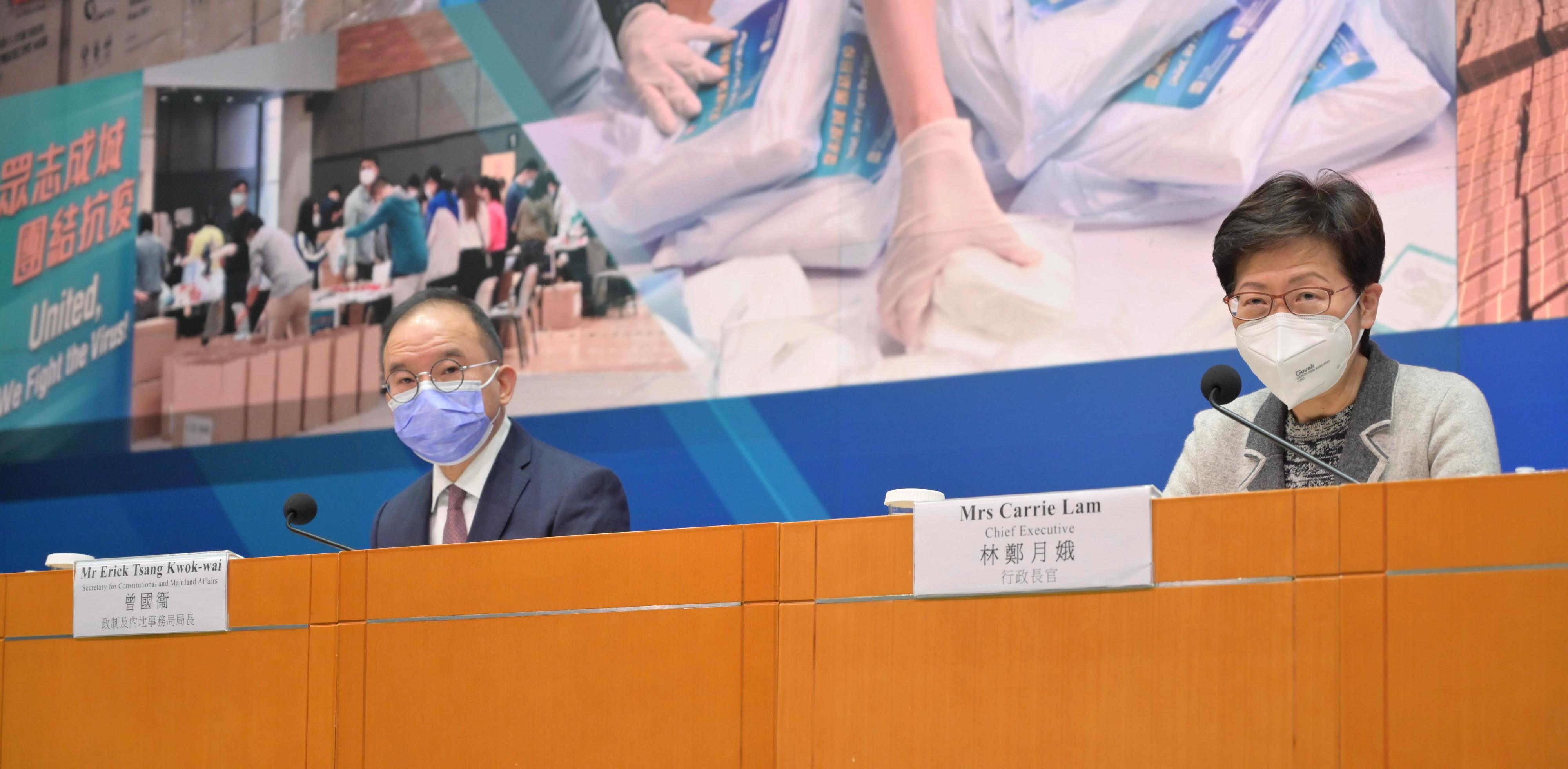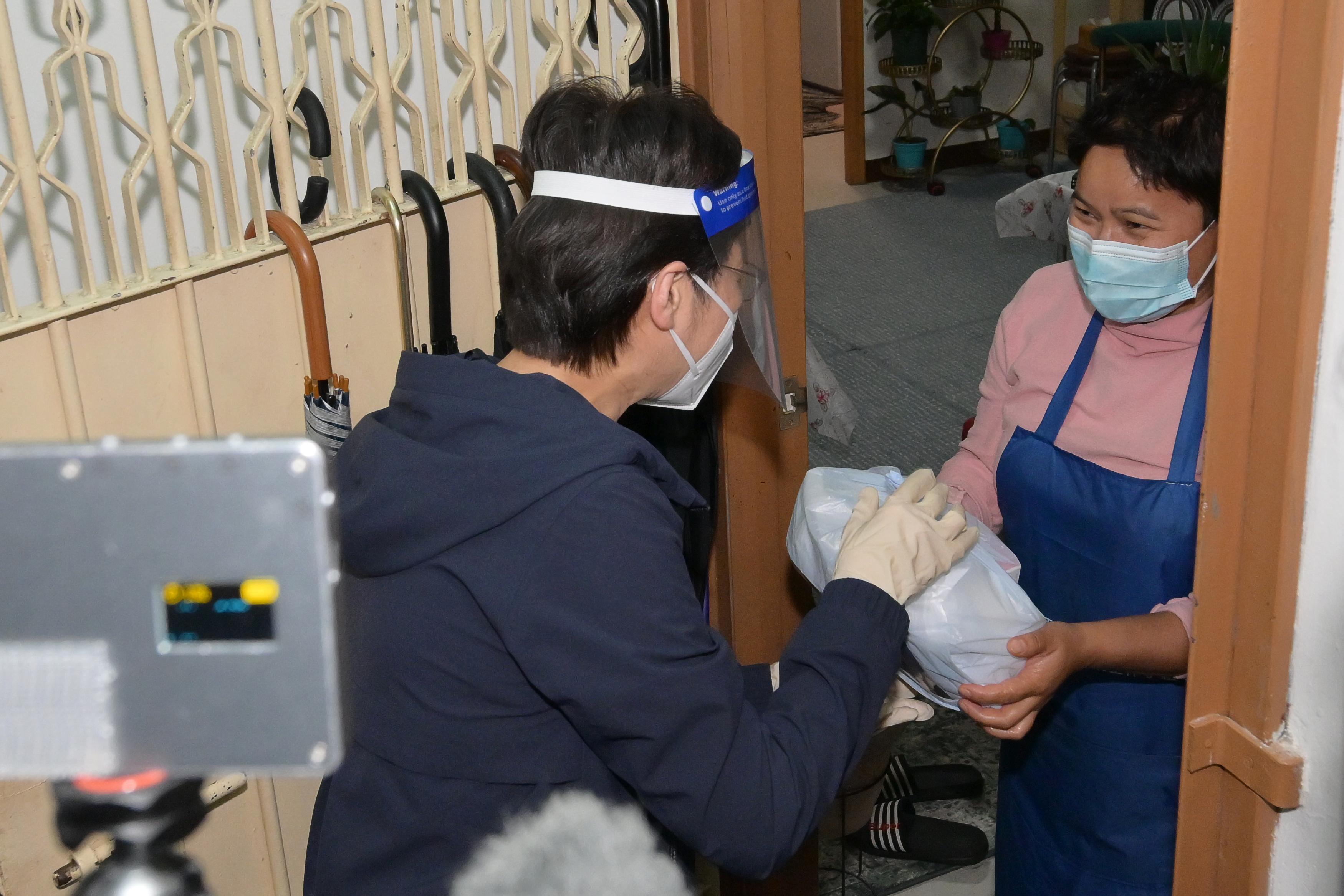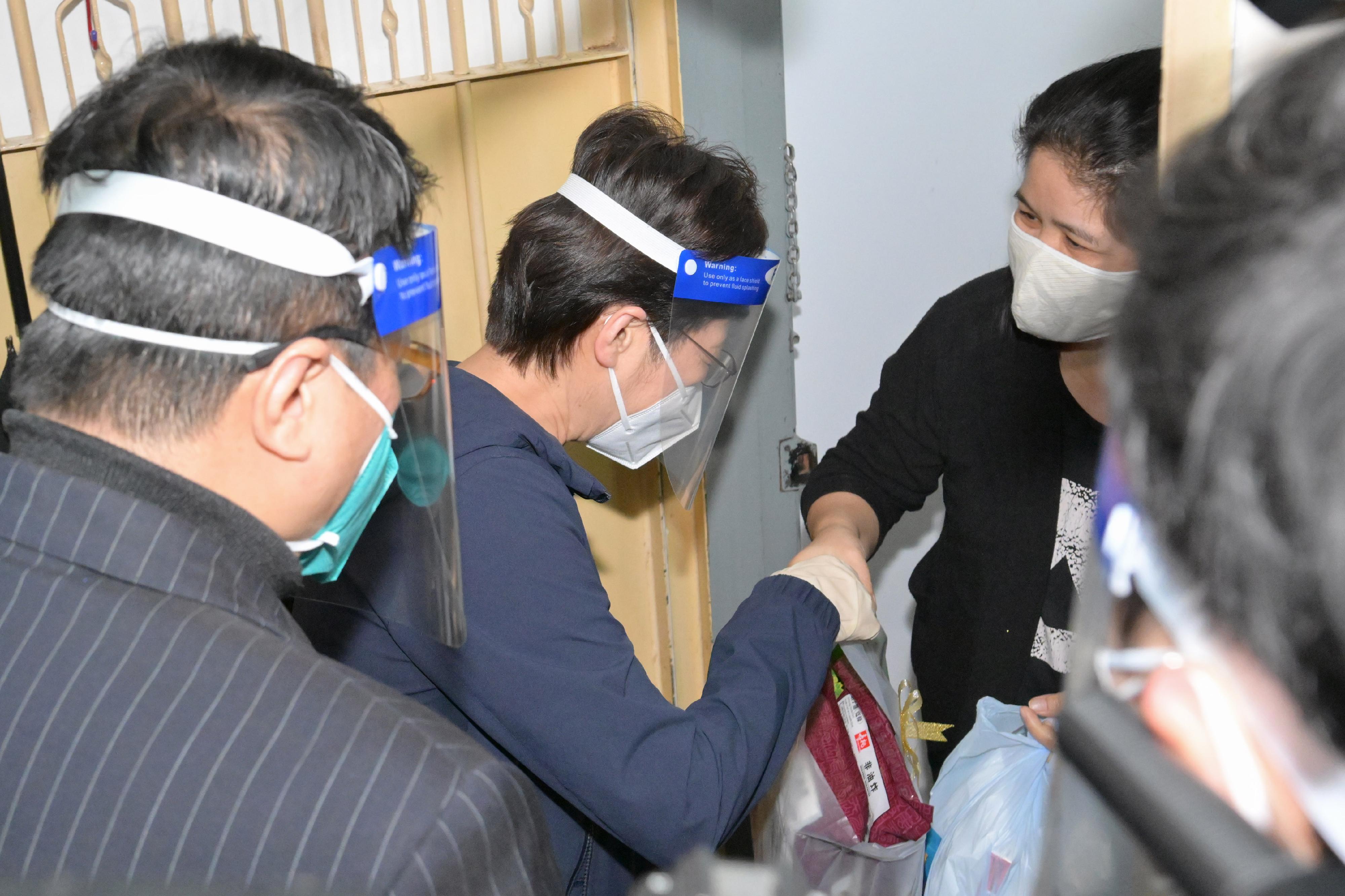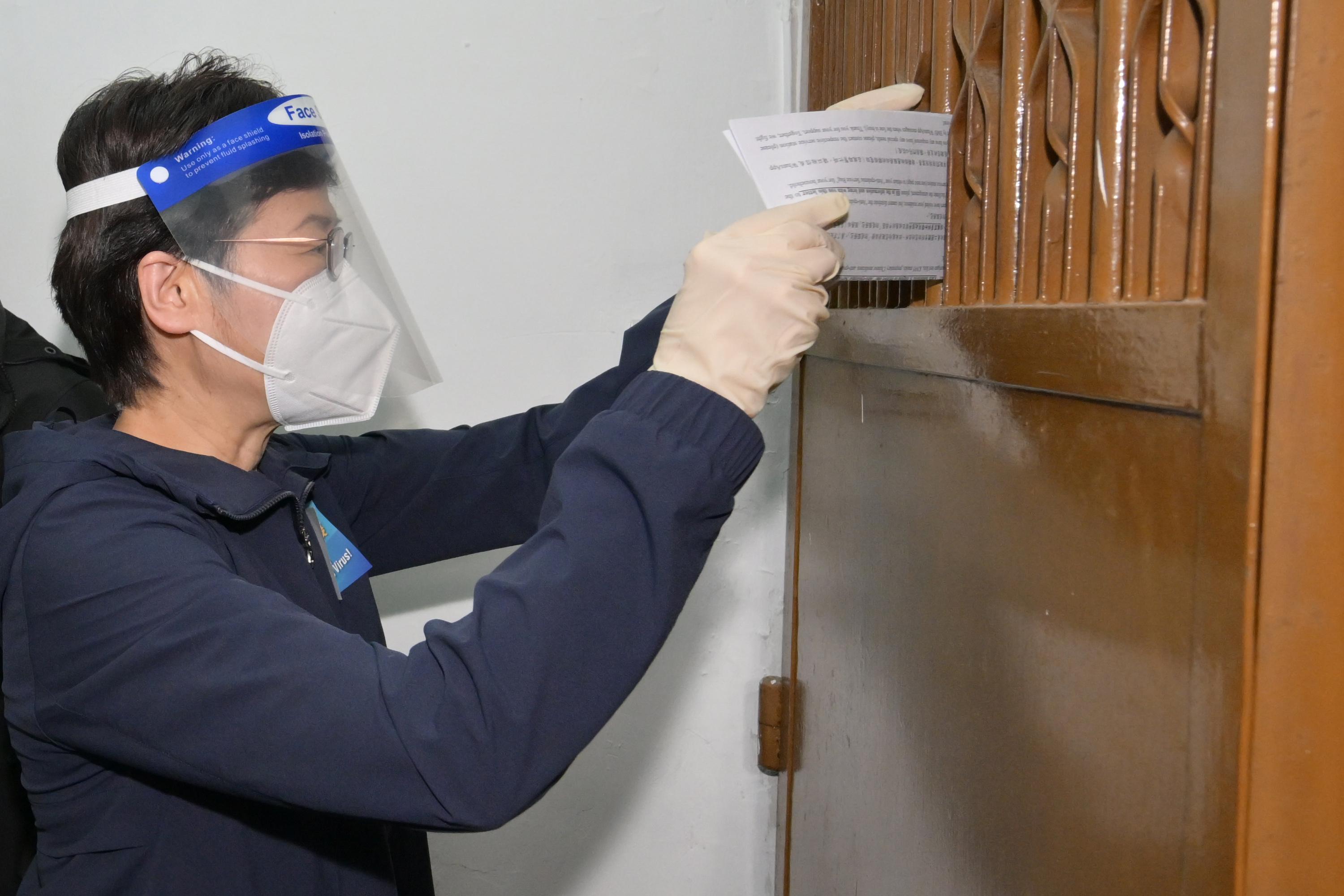The Chief Executive, Mrs Carrie Lam, held a press conference on anti-epidemic measures this morning (April 2). Also joining was the Secretary for Constitutional and Mainland Affairs, Mr Erick Tsang Kwok-wai. Following is the transcript of remarks of the press conference:
Reporter: Good morning. First, Mrs Lam, can you clarify and set the record straight on where you were yesterday? Who did you meet? And what were the changes in your diary? And did you meet Xia Baolong (Director of the Hong Kong and Macao Affairs Office of the State Council and Vice-Chairman of the National Committee of the Chinese People's Political Consultative Conference) to talk about the pandemic work and also the situation with the elections would be postponed? And second of all, we would like to ask a bit more about the distribution of the RAT (rapid antigen test) kits next week. So you've mentioned that it's not compulsory, it's voluntary. How can you ensure that people will be incentivised to report if they test positive on RAT? A lot of people are concerned that they will be sent to these community isolation facilities. Is there any rubric on that? And you also mentioned that distributing the kits and doing RATs in the next weekend is not a replacement for the community universal testing, so can you explain what is the reasoning behind this and what goal does this testing have to achieve with the RAT? How many cases do you want to find out and what threshold of cases positive will be constituted as a, sort of, dire situation or a situation that is worth more action to?
Chief Executive: First of all, the CE (Chief Executive)'s diary contains various appointments and commitments of the Chief Executive. I don't think it is this Chief Executive, every Chief Executive will have a number of appointments, meetings, commitments and visits to carry out during a day. When it is a public occasion or an occasion that should be publicised, it will be publicised. Just like I'm going to help distribute the service bags this afternoon, that will be publicised. You will have a video, photos and a press release. But there are always commitments that need not be publicised. Again this afternoon, I'm going to have a webinar with the school community to listen to their views first-hand about the resumption of face-to-face learning. That is really an exchange of views leading to something that we will publicise later on about education matters, and that will not be publicised. I have already taken the exceptional step of telling you that even in this afternoon, I got two commitments: one will be publicised, one will not be publicised. It's not a matter of clarification or setting the record straight. It is a matter of how the Chief Executive operates in Hong Kong and I suppose all government leaders will have that sort of discretion and freedom to operate.
About the RAT exercise that we want to do together with the people of Hong Kong, one reason is we are seeing a downward trend in the number of cases and the various indicators that we are monitoring like the sewage tests, the preliminary positive cases found in an RTD (restriction-testing declaration) operation, the positive rate among the tests taken at the community testing centres and so on. But the absolute numbers are still high – yesterday it was close to 6 000 cases. That suggests that we still have quite a number of silent transmissions in the community. It will be to the benefit of all of us, to the community at large, to try to identify all these infected cases as soon as possible. While we are doing the RTD and the CTN (compulsory testing notice) to find out positive cases based on PCR (polymerase chain reaction-based nucleic acid) test, since the RAT test is a much more convenient, self-administered type of instrument that we have accepted – worldwide, they have accepted that RAT positive is a good enough confirmation of a person being infected – we want to do it on a more extensive basis since we have already distributed enough RAT kits to every family in Hong Kong under the other exercise that started three days ago in terms of packaging and will start today in terms of the actual distribution to households in Hong Kong.
It is a voluntary exercise, so we could only appeal to people's co-operation riding on their aspiration to resume normal daily living as soon as possible and also to be able to travel. In order to do that, as I have mentioned many, many times, in tackling a public health crisis, whether in vaccination, testing or isolation, we need the full co-operation and support of the people. We don't just rely on legal instruments. We have to appeal to people's co-operation, understanding and participation. This is an exercise of this nature. And I would hope that those intangibles will be good enough to incentivise people to take a test. It's a very simple test. I'm sure you have done it and that will help us to achieve our objectives much more effectively.
You asked about the CIF (community isolation facility). Actually since the fifth wave, understandably because of a large number of infected cases, not every positive case was sent to a community isolation facility. That was simply not practical at the early stage of the epidemic. Now that we have 20 000 beds in six CIFs, community isolation facilities, built with the support of the Central Government, we are in a much, much better position to resume isolation, which is a more effective way to combat the spread of the virus. But like all things in Hong Kong, one has to strike a balance, a very pragmatic balance. Some people are very resistant to go to a CIF, but at the same time, they are living in a very reasonable and decent living environment that will enable them to meet the requirement for isolation. For example, they have their own bedroom, they have their own toilet, they have no symptom whatsoever, they could self-care, they don't have any vulnerable or high-risk family members in the household. What the Centre for Health Protection (CHP) has done in this fifth wave is to allow these infected persons to fill in a questionnaire. And they just updated and expanded the questionnaire two days ago to allow each individual to go through this self-assessment process in a very systematic and rational way; and ultimately, a decision would be reached by the CHP whether this person is suitable for home isolation. The Centre for Health Protection will be issuing isolation orders specifically for home isolation or for non-home isolation. Non-home means going into a CIF.
I will really appeal again to people's understanding and co-operation. You don't have to believe in those stories that you read on the social media. Our CIFs are very well managed, they are as user-friendly as possible and staying there for a few days of isolation will provide better protection to his or her family members because he or she is an infected person, so isolating him or her in the government isolation facility will give better protection to the family members and also give better assurance to our anti-epidemic efforts. We will continue, through the Secretary for Security's task force, to improve the service at the CIFs but we also need the people's co-operation.
Then you asked about the CUT (Compulsory Universal Testing). As I said, at the beginning, this exercise to invite all people in Hong Kong to do an RAT test daily on the eighth and ninth and 10th of this month is not a replacement of the Compulsory Universal Testing, which is still necessary and essential in order to eliminate the spread of the virus in Hong Kong. But when we will do it is something that we will have to further monitor, especially there's now a complication about the large number of people who have been infected but not reported. These people, strictly speaking, would have their antibodies and should not be subject to another test because if another test, especially a PCR test, finds out some residue of virus in their body, then the experts have to tell us if that is a re-positive case. Is that a false case or what? Given the likely large proportion of people in this sort of situation, we still have to listen to our experts in the Government and outside of the Government before we consider it a good enough timing to commence a Compulsory Universal Testing in Hong Kong. Thank you.
(Please also refer to the Chinese portion of the transcript.)




